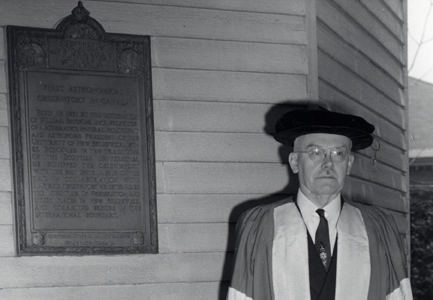
b. 1899, Canso N.S.
d. 1979, Ottawa
Beals took his undergraduate degree in 1919 at Acadia University, and after a brief time at Yale University working on his doctorate, he transferred to the University of Toronto where he earned a Master’s Degree in 1923. He later obtained a PhD in physics from the University of London, in England.
After a brief time as a Physics professor at Acadia, Beals accepted a job at the Dominion Astrophysical Observatory in Victoria, BC in 1927, where he remained for two decades.
Beals began “ …to perfect or invent new instruments for the observatory’s telescope. He established a reliable temperature scale for very hot stars and was the first to demonstrate that their emission spectra are proof that they are surrounded by large gaseous envelopes. ” For research in this area, Beals was awarded a second doctoral degree from the University of London in 1934.
In 1946, Beals left Victoria for the Dominion Observatory in Ottawa, becoming its Director in 1947. Once there, he undertook an extensive programme of modernisation – attracting many young scholars to the Observatory, improving its magnetic and solar facilities, and installing new telescopes across Canada. In 1956 he began publishing geophysical studies on terrestrial and lunar impact craters, and demonstrated that meteorite bombardment played a major role in the formation of the planets, including Earth. He served as Dominion Astronomer until 1964.
Recognized internationally as one of the leading astronomers of his day, Beals received many awards for his work in astronomy and geophysics, including the Order of Canada, and membership in the Royal Society of London. A lunar crater and asteroid 3314 were named for him. In May 1956, UNB awarded Dr. Beals an honorary D.Sc. at Encaenia.
In 1981, the RASC created the Carlyle S. Beals Award, given every two years, to a Canadian astronomer, or an astronomer working in Canada, in recognition of their outstanding achievements in research.
References: The Canadian Encyclopedia; Virtual Museum Canada: astro-canada.ca